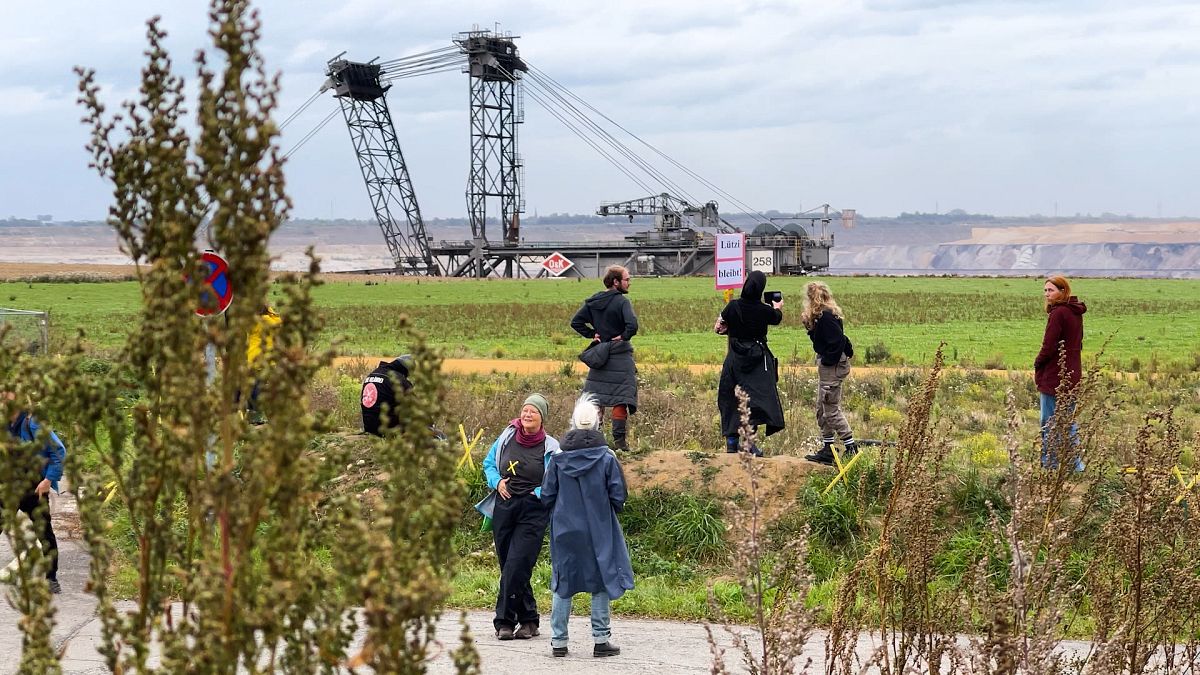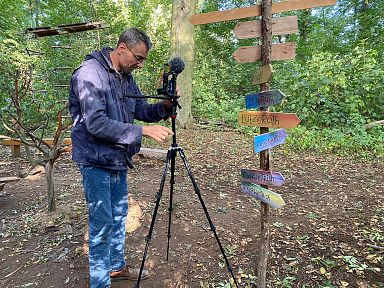Euronews' Hans von der Brelie heads to one of the world’s largest opencast pits, Garzweiler II, to witness for himself the battle to close the country's lignite mines.
From blockages to weekly protests, environmental campaigners in Germany are angry at the continued extraction of coal. Euronews' Hans von der Brelie heads to one of the world’s largest opencast pits, Garzweiler II, to witness for himself the battle to close the country's lignite mines.
I arrive at sunrise, overwhelmed by the beauty of the industrial landscape, which stretches as far as the eye can see. An abstract pattern of earth and lignite layers bathed in the early morning light.
But it’s a deadly beauty: if all those hundreds of millions of tonnes of coal actually do get excavated and burnt, Germany can say goodbye to its climate targets. In recent years the country has started waking up to what climate catastrophe might actually look like: blisteringly hot summers and apocalyptic rainfall that has the ability to sweep both towns and lives away.
It is no coincidence that I am here today. One of my sources inside the German climate protection movement informed me - without giving any real detail - that "something big" was planned. Everything is very top-secret. All I'm told is where and when to go.
The timing is almost perfect. In Berlin, the country's political parties continue to hold talks over forming a new coalition government. Climate, and especially concerns over coal, are some of the biggest issues up for discussion. In addition, the upcoming international climate change conference in Glasgow - the COP 26 - is just around the corner.
Suddenly I hear the sound of police sirens cutting through the chilly morning air. A few minutes later a helicopter shows up hovering over the pit. I get a short message on my encrypted messaging app: 'a digger and two giant stackers blocked.'
It soon becomes apparent that a completely unknown group called 'Counterattack - for a Good Life' has successfully sneaked into the opencast pit during the night. Some of the 21 activists have chained themselves to the towering structures of the excavators, successfully bringing the huge machines to a complete standstill.
Mine expansion threatens villages
Close to the pit I meet Lara and Sarah at a protest camp in the village of Lützerath. It's one of six villages near the expanding mine under threat.
After a while they eventually agree to let me talk to the activists still chained to the diggers. Taking the phone I hear a voice say: “We feel like we've been on a roller coaster; it’s not easy sneaking into an opencast pit and blocking a digger…” I ask them what they want “We decided to take action in order to push for an end to the use of coal as soon as possible. The current timetable to stop using coal by 2038 and to continue destroying villages like Lützerath is totally unacceptable."
I have visited a number of mines across Europe for Euronews and I remember clearly the exchanges I had with coal miners, union bosses, government ministers in countries like Poland, Romania and elsewhere in central and eastern Europe. One of their biggest arguments was: "Why should we stop using coal early when a rich country like Germany has no plans to do so before 2038?"Arguably it's that reluctance in Germany to move away from coal that has had a broader impact on Europe's energy transition.
But could things be about to change? The Social Democrats, Liberals and Greens, who are tipped to form Germany's next coalition government, have hinted their intent to phase out coal use by 2030. A ray of hope perhaps - not only in the fight against climate change, but also for the residents of the - as yet - undestroyed villages neighbouring the Garzweiler II mine.

